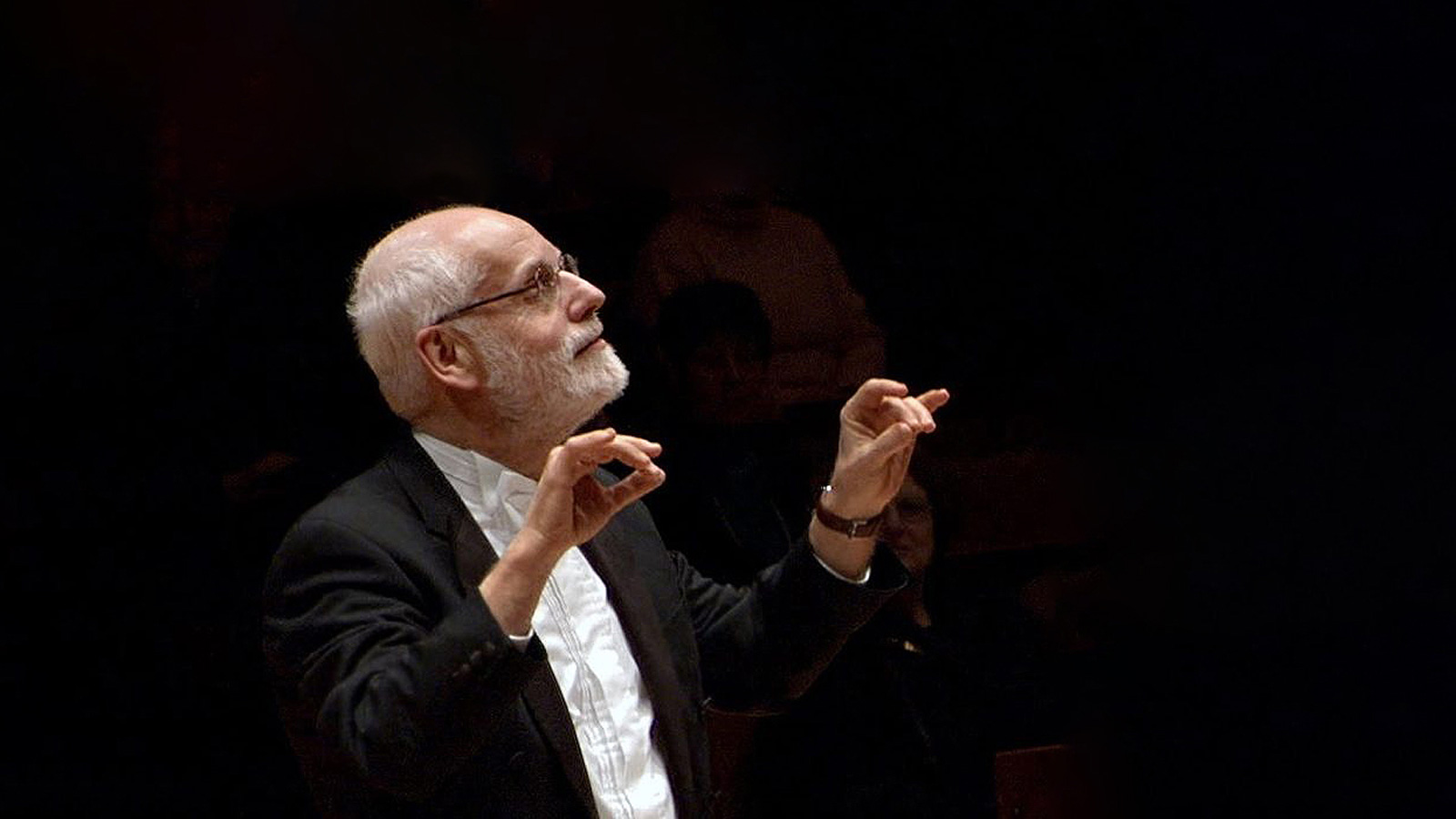Mozart's Mass in C minor
Gulbenkian Choir and Orchestra
Event Slider
Date
- / Cancelled / Sold out
Location
Grand Auditorium Calouste Gulbenkian FoundationPricing
50% – Under 30 years old
15% – Over 65 years old
- Conductor
- Soprano
- Leonor Amaral Soprano
- Tenor
- Baritone
-
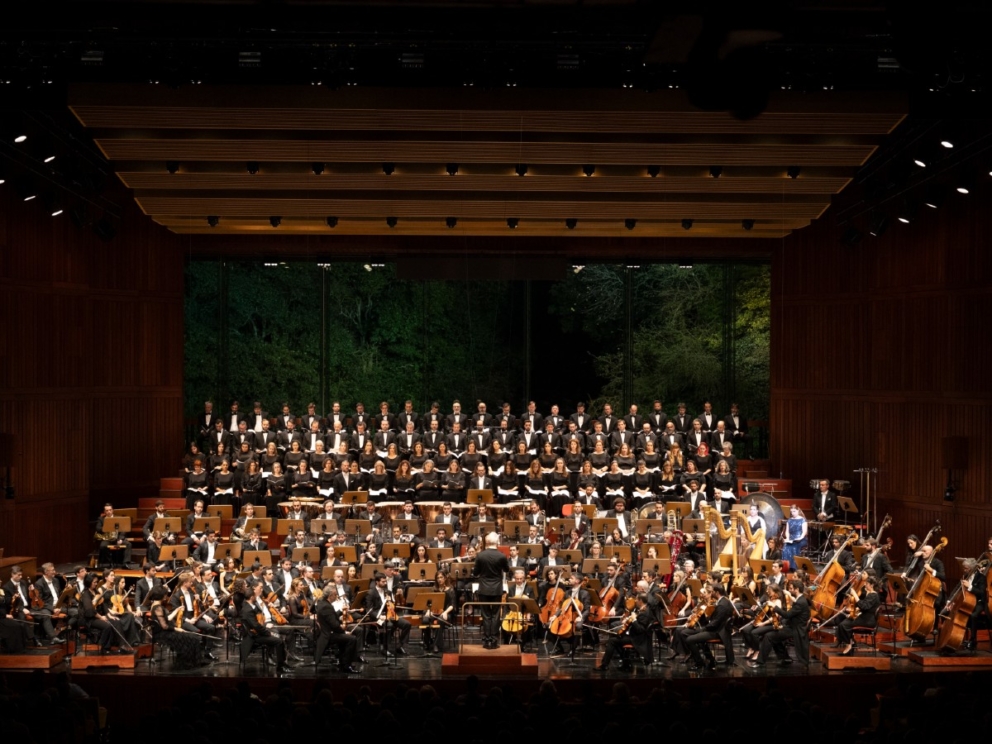
Gulbenkian Choir
Coro Gulbenkian was founded in 1964 by the Calouste Gulbenkian Foundation as a full symphonic body of around 100 singers. The choir joins the Orquestra Gulbenkian and other orchestras to perform Classical, Romantic and Contemporary choral-symphonic repertoire, but can also perform a cappella. It has performed – and often premiered – many 20th century works by Portuguese and international composers.
Coro Gulbenkian has been invited to collaborate with major international orchestras, under the direction of conductors such as Claudio Abbado, Colin Davis, John Nelson, Emmanuel Krivine, Esa-Pekka Salonen, Frans Brüggen, Franz Welser-Möst, Gerd Albrecht, Michael Gielen, Michael Tilson Thomas, Rafael Frübeck de Burgos, René Jacobs and Leonard Slatkin, among others.
Besides its regular season of concerts in Lisbon and frequent national tours, Coro Gulbenkian has repeatedly toured Argentina, Belgium, Brazil, Canada, Denmark, France, Germany, Hungary, India, Iraq, Israel, Italy, Japan, Macao, Malta, Monaco, Netherlands, Spain, the United Kingdom, the United States of America and Uruguay.
Coro Gulbenkian has recorded extensively for Philips, Deutsche Grammophon, Erato, Cascavelle, Musifrance, as well as FNAC-Music, performing a wide range of repertoire, from Early-Renaissance polyphony to Xenakis. Several of these albums received international awards.
Michel Corboz was the Principal Conductor between 1969 and 2019. Jorge Matta and Inês Tavares Lopes are currently the Associate and Assistant conductors, respectively.
-
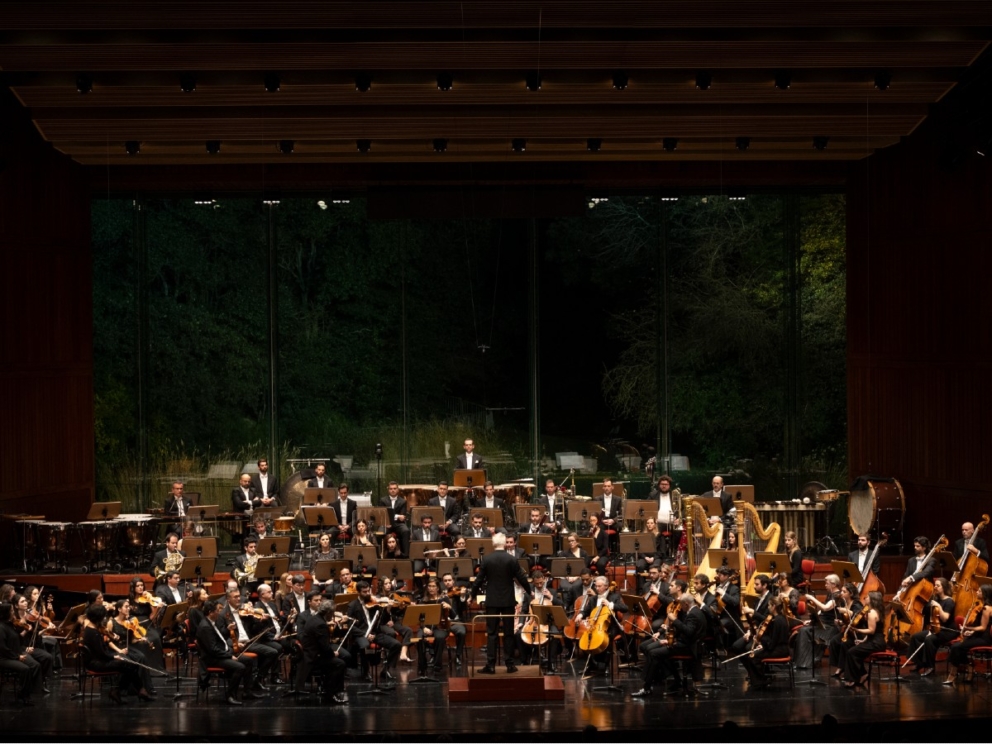
Gulbenkian Orchestra
In 1962, the Calouste Gulbenkian Foundation decided to establish a permanent orchestral ensemble. Originally with only twelve musicians (strings and continuo) it was named “Orquestra de Câmara Gulbenkian”. This collective was successively enlarged and today the “Orquestra Gulbenkian” (the name it has adopted since 1971) has a permanent body of sixty instrumentalists, a number that can be expanded depending on the repertoire.
This structure allows the Gulbenkian Orchestra to interpret works from the Baroque and Classical periods, a significant part of 19th century orchestral literature and much of the music of the 20th century, including works belonging to the current repertoire of the traditional symphonic orchestras. In each season, the orchestra performs on a regular series of concerts at the Gulbenkian Grand Auditorium in Lisbon, where it has had the opportunity of working together with some of leading names of the world of music (conductors and soloists). It has also performed on numerous locations all over Portugal, in an effort to decentralize music and culture.
The orchestra has been constantly expanding its activities in the international level, performing in Europe, Asia Africa, and the Americas. In the recording field, Orquestra Gulbenkian is associated to labels as Philips, Deutsche Grammophon, Hyperion, Teldec, Erato, Adès, Nimbus, Lyrinx, Naïve and Pentatone, among others, and this activity was recognized with several international prizes.
-
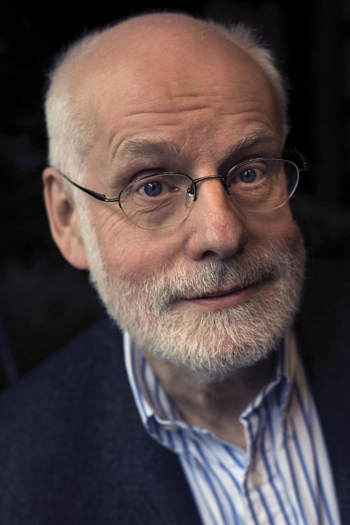
Ton Koopman
Conductor
Born in Zwolle (The Netherlands) Ton Koopman had a classical education and studied organ, harpsichord and musicology in Amsterdam. He received the Prix d‘Excellence for both instruments. Naturally attracted by historical instruments and fascinated by the philological performance style, Koopman concentrated his studies on Baroque music, with particular attention to J. S. Bach and D. Buxtehude, and soon became a leading figure in the "historic informed performance" movement.
As organist and harpsichordist Ton Koopman has appeared in the most prestigious concert halls of the world and played the most beautiful historical instruments of Europe. At age 25, he created his first baroque orchestra; in 1979, he founded the Amsterdam Baroque Orchestra, followed in 1992 by the Amsterdam Baroque Choir. Combined as the Amsterdam Baroque Orchestra & Choir, the ensemble soon gained worldwide fame. With a repertoire ranging from the early Baroque to the late Classics, they have performed at the Concertgebouw in Amsterdam, Théâtre des Champs-Elysées and Salle Pleyel in Paris, Barbican and Royal Albert Hall in London, Musikverein and Konzerthaus in Vienna, Philharmonie in Berlin, Lincoln Center and Carnegie Hall in New York, Suntory Hall in Tokyo etc.
In recent years, Ton Koopman has been very active as a guest conductor working with the most prestigious orchestras in Europe, USA, and Japan.
Among Ton Koopman's most ambitious projects has been the recording of the complete Bach cantatas, a massive undertaking for which he has been awarded the Deutsche Schallplattenpreis "Echo Klassik", the BBC Award, the Hector Berlioz Prize and has been nominated for the Grammy Award (USA) and the Gramophone Award (UK). In addition to the works of Bach, Koopman has long been an advocate of the music of Bach's predecessor Dieterich Buxtehude, and following the completion of the Bach project, he embarked on the recording of the Buxtehude-Opera Omnia; the edition consists of 30 CDs.
Ton Koopman has recorded a far over 400 Cds and LPs for Erato, Teldec, Sony, Deutsche Grammophon and Philips. In 2003 he founded his label “Antoine Marchand”, a sub-label of Challenge Classics. Ton Koopman publishes regularly. Among many works, he has edited the complete Händel Organ Concertos for Breitkopf & Härtel and published a new edition of Händel’s Messiah, and Buxtehude‘s Das Jüngste Gericht for Carus Verlag.
Ton Koopman is President of the International Dieterich Buxtehude Society. He was awarded with the Bach Medal of the City of Leipzig (2006), the Buxtehude Prize of the city of Lübeck (2012), the Bach Prize of the Royal Academy of Music in London (2014) and with the prestigious Edison Classical Award (2017).
Since 2019 he is President of the Leipzig Bach Archive.
Ton Koopman is Emeritus Professor at the University of Leiden and at the Conservatory of Den Haag, an Honorary Member of the Royal Academy of Music in London, an Honorary Doctor in Linz and Lübeck, and artistic director of the Festival “Itinéraire Baroque”.
-
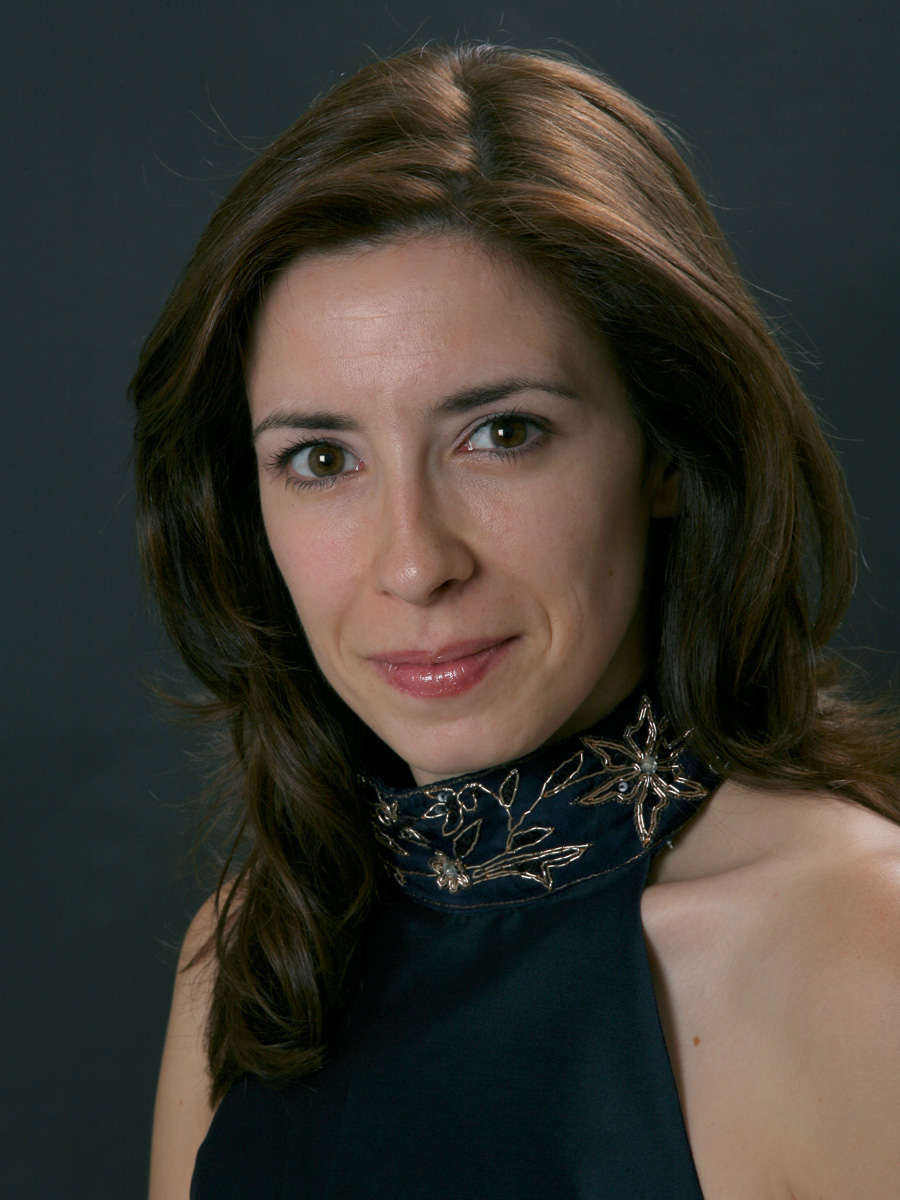
Sara Braga Simões
Soprano
Sara Braga Simões is a winner of several national and international prizes. International Reviews praise her impressive range and her outstanding performance.
She is a regular guest at São Carlos - the Lisbon Opera House - and all the main theatres, concert halls and music festivals in Portugal. She has also performed in the U.K., Spain, France, Andorra, Slovenia and Mozambique.
Sara’s operatic roles include Pamina (Die Zauberflöte), Susanna (Le Nozze di Figaro), Rita (Donizetti), Gretel (Hänsel und Gretel), The Governess (The Turn of the Screw), Despina (Così fan Tutte), Zerlina (Don Giovanni), Rowan (Britten's The little Sweep), among many others.
Her concert performances include Händel’s Messiah, Poulenc’s Gloria, Brahms’s Ein Deutsches Requiem, Des Knaben Wunderhorn, Berlioz’s Les Nuits d’étè and other works by Pergolesi, Vivaldi, Ravel, Dvořák, Berio, George Crumb, George Benjamin, Peter Maxwell Davies, among others.
She was chosen to sing the female leading role in the world première of seven XXI century operas and many works of renowned composers such as João Pedro Oliveira, Nuno Côrte-Real, Luís Tinoco and Aubert Lemeland.
She made her London debut with London Sinfonietta in the world premiere of Pedro Amaral’s Opera O Sonho [The Dream].
Her performances are regularly recorded by RTP (portuguese state television) and RDP (portuguese state radio). She recorded the complete works for voice and piano by Eurico Thomaz de Lima with the pianist Luís Pipa.
Sara has sung with conductors such as Lawrence Renes, Martin André, Stefan Asbury, Peter Rundell, Johannes Willig, Laurence Cummings, Marcos Magalhães, Marc Tardue, Pierre-Andre Valade, João PAulo Santos, among others.
She studied singing with Manuela Bigail, Rui Taveira and Peter Harrison. She followed her studies in London, with Susan McCulloch. Presently, she works with the renowed soprano Elisabete Matos.
-
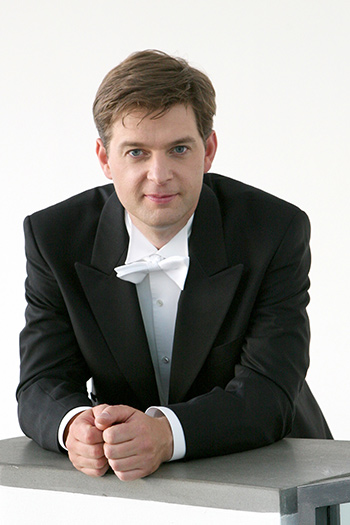
Tilman Lichdi
Tenor
Tilman Lichdi has established himself as one of the most important concert and song interpreters, particularly as the Evangelist in Bach's oratorios and passions. Lichdi has sung concerts in Europe, the USA, Australia, South America, and Asia with conductors such as Ton Koopman, Thomas Hengelbrock, Martin Haselböck, Peter Dijkstra, Frieder Bernius, Christoph Perick, Bernard Labadie, Marcus Bosch, Hervé Niquet, Hartmut Haenchen, Kent Nagano, Christoph Poppen, Claus Peter Flor, Michail Pletnev, Michel Corboz, Hans-Christoph Rademann, Teodor Currentzis, and Herbert Blomstedt.
Among the many recordings with Tilman Lichdi, two recordings of Schubert's song cycles are particularly noteworthy: "Die schöne Müllerin" and "Die Winterreise," both in a new Arrangement for voice and guitar. In addition to his international performances, he is currently serving as a substitute professor for vocal studies at the Academy of Music in Darmstadt.
From 2005 to 2013, Tilman Lichdi was a permanent member oft Thema Ensemble at the State Theater in Nuremberg. There, he embodied roles such as David and Steersman in Wagner's "Die Meistersinger" and "The Flying Dutchman," Tamino, Ferrando, Belmonte, Don Ottavio, Count Belfiore in Mozart's "The Magic Flute," "Cosi fan tutte," "The Abduction from the Seraglio," "Don Giovanni," "La finta giardiniera," and Count Almaviva in Rossini's "Il Barbiere di Siviglia." Tilman Lichdi is the recipient of the Richard Strauss Plaque and the Bavarian Art Promotion Prize 2012 in the performing arts.
Tilman Lichdi grew up near Heilbronn and received his first vocal training at the age of 18 from Alois Treml (State Theater Stuttgart). However, he initially studied trumpet for 4 years with Prof. Günther Beetz in Mannheim and then switched to vocal studies with Prof. Charlotte Lehmann in Würzburg in 1999, which he completed with distinction.
-
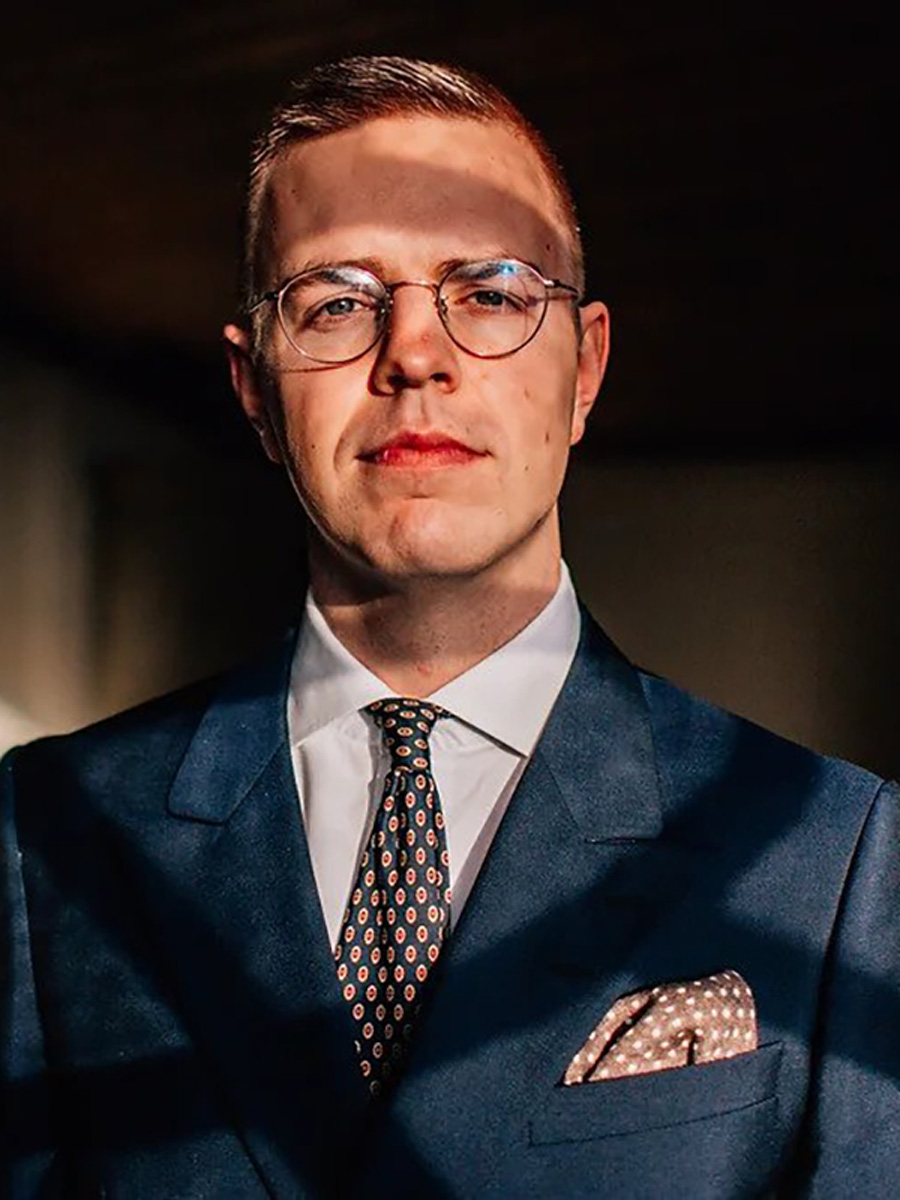
Arvid Eriksson
Baritone
This year, the talented young baritone Arvid Eriksson returns to Berwaldhallen and Swedish Radio Symphony Orchestra, meets the award-winning Ensemble Correspondances for the first time, and makes his debut with Gulbenkian Orchestra and Ton Koopman.
Born in Uddevalla in 1998, Arvid Eriksson currently lives in Stockholm, where he graduated from The Royal College of Music in 2021. His teachers during the training have been, among others, Petteri Salomaa and Erik Årman. He also holds a degree in church music. He began his professional career at the age of sixteen, singing with the renowned ensemble Göteborg Baroque, of which he was also a member until 2022.
Arvid has focused on the performance of art song and concert, which he has developed with the guidance of artists such as Anne Sofie von Otter and Peter Mattei. In 2021, he made his debut in Berwaldhallen, Stockholm, performing Fauré’s Requiem with the Swedish Radio Symphony Orchestra and the Swedish Radio Choir. Among the highlights of 2022 were performances of Handel's Messiah with the Helsingborg Symphony Orchestra and a tour of Mahler's Rückert-Lieder in an arrangement for baritone and piano quartet.
Arvid’s extensive concert repertoire includes works by Bach such as the St John’s Passion, St Matthew Passion, Christmas Oratorio, B-minor Mass and several cantatas, Handel’s Messiah, Haydn's The Creation and Stabat Mater, Requiems by Brahms, Mozart, Fauré, Duruflé and others, as well as works by Beethoven, Britten, Monteverdi, Roman, Larsson and many more.
Arvid has performed a number of well-known song cycles, including Schumann’s Dichterliebe and Liederkreis op. 24, Mahler’s Rückert-Lieder, Beethoven’s An die ferne Geliebte and Vaughan Williams’ Songs of Travel. He also frequently performs lieder by Schubert, Strauss, Brahms, Ravel, Sibelius, and Finzi, among others. Closest to his heart, however, are the Swedish art songs, many of which he has performed, including songs by Stenhammar, Rangström, and Peterson-Berger.
Wolfgang Amadeus Mozart
Symphony No. 36, in C major, K. 425, Linz
— Intermission 20 min —
Wolfgang Amadeus Mozart
Mass in C minor, K. 427 *
* Reconstruction by Ton Koopman with movements from Michael Haydn’s Jubiläumsmesse (1782).
Founder of the Amsterdam Baroque Orchestra, Dutch conductor Ton Koopman has earned a well-deserved place of prominence as one of the foremost experts on Baroque music and, in particular, the works of J. S. Bach. However, Koopman’s mastery often extended to the Mozartian repertoire as well, with one of the highlights of his career being the integral of the Austrian composer’s symphonies. It is to this precious relationship with Mozart that Koopman returns in this new presentation at Gulbenkian Música.
Sponsor Gulbenkian Music
The Calouste Gulbenkian Foundation reserves the right to collect and keep records of images, sounds and voice for the diffusion and preservation of the memory of its cultural and artistic activity. For further information, please contact us through the Information Request form.

